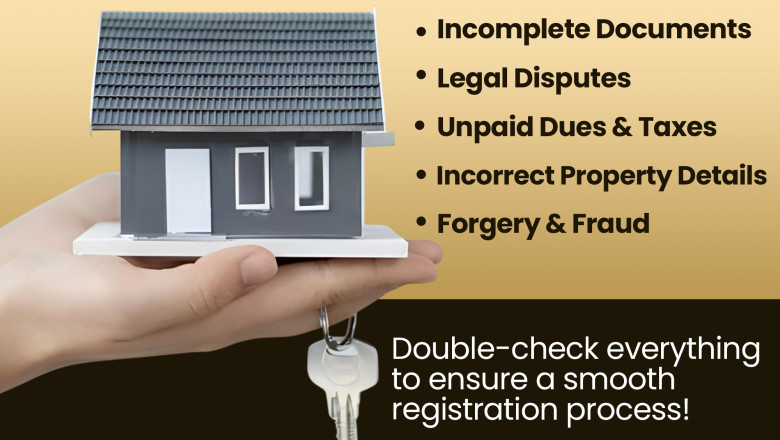views
Property registration is a vital process that confirms ownership rights and provides legal protection during a transaction. Countless time-consuming registrations fail due to problems that can be avoided through careful steps and due diligence. Below, we explore the five key reasons why property registration fails and how to prevent them.
1. Incomplete Documents
One of the most common reasons registrations fail is due to incomplete or inaccurate documentation. Key documents such as, but not limited to, sale deed, encumbrance certificate, title deed, property tax receipts, and identification must be completed and in order, in order for your property to be registered successfully.
How You Can Avoid This Issue:
Make a comprehensive checklist for all documents needed and have them organized and fact-checked with the assistance of a legal professional or real estate adviser. Checking documents before your registration will ensure you do not run into any issues at the last minute.
2. Legal Disputes
Properties that have existing legal claims, whether they pertain to ownership, entitlement, deeming, or litigation, will frequently have shortcomings in the registration process because buyers who were unaware of contradictory claims encounter problems that void their transaction.
How to Stay Out of Trouble:
If you have a definite property that you intend to purchase, ask the seller if a comprehensive title search has been completed before you submit a purchase contract. Ask for legal clearance paperwork to verify the property is not in dispute. You may also consult with a lawyer to hear their input and to better understand the legal eligibility of the property and the seller's position in the event of a subsequent dispute.
3. Unpaid Dues & Taxes
If there are outstanding property taxes, water or electricity bills, or unpaid society maintenance dues, the registration can be delayed, or in some cases, rejected. Authorities responsible for property registration will deny an application if there are any outstanding dues against a property.
How to Prevent This Situation:
The best way to avoid this situation is to always ask the seller for up-to-date tax receipts and a no-dues certificate indicating that there are no outstanding dues. If there are outstanding dues, work with the seller to make sure they are cleared.
4. Incorrect Property Details
If there is wrong property information, meaning the address is different, the survey number is different, or the built-up area is different, or any other information is wrong or inconsistent, this can cause the registration to fail. Often, there can be wrong or inconsistent information in property documents, which can complicate things or simply confuse the sub-registrar office into rejecting.
How to Ensure Accuracy:
Before proceeding with registration, verify all property information, such as legal appointment (LOA) and documents, against official land records. If you find any inconsistent information, you must rectify the information through the proper legal procedures in advance of proceeding to registration.
5. Forgery and Fraud
Property fraud can pose a significant danger when buying real estate, ranging from forged documents, false ownership claims, or even sellers who do not have the right to sell the property. Buyers who do not thoroughly verify the genuineness of the documents they are provided with may find themselves wrapped up in legal disputes down the road.
How to Protect Yourself:
Ensure you have thoroughly confirmed the seller's identity and ownership before agreeing to purchase. Obtain certified copies of the property documents from the land registry office and do not transact in cash. Seeking legal advice can assist you in determining whether the transaction is valid.
Buying a property will be the biggest investment you will make in your life, and proper registration is just as crucial as the purchase itself. If you take care and apply the basic window of opportunity to avoid basic problems, this may help your purchase run more smoothly in terms of registration. Remember to obtain legal advice when you feel unsure, because if you take legal steps now, a larger complication in the future is less likely.

















![Helium Gas Market [2025-2033] is Growing Rapidly at Upcoming](https://timessquarereporter.com/public/upload/media/posts/2025-04/15/helium-gas-market-2025-2033-is-growing-rapidly-at-upcoming_1744710967-s.jpg)



![Solar shower Market [New Report] by Updated Development 2033](https://timessquarereporter.com/public/upload/media/posts/2025-04/16/solar-shower-market-new-report-by-updated-development-2033_1744793395-s.jpg)
Comments
0 comment